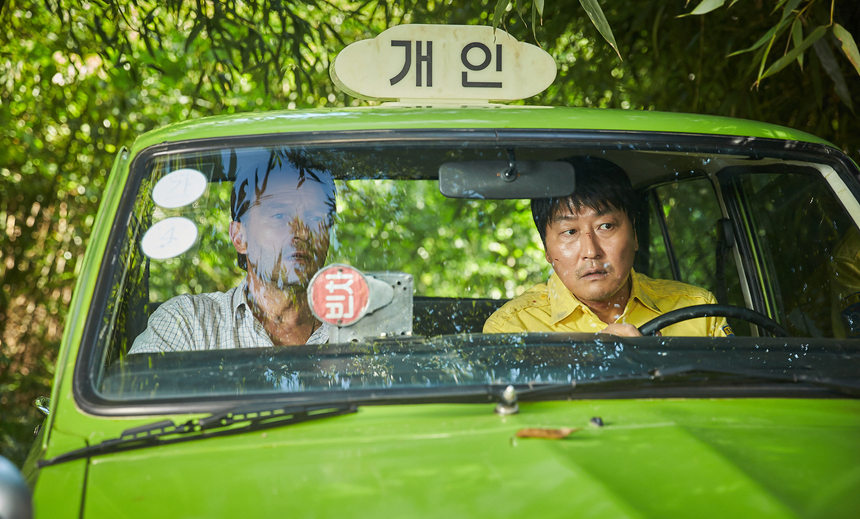Review: A TAXI DRIVER Rolls Up to Korean History with Grace, Humor and Tears

History and commerce combine to terrific effect in the protest drama A Taxi Driver. Song Kang-ho is remarkable in his second film with director Jang Hoon, following Secret Reunion, while German star Thomas Kretschmann delivers what is probably the best performance by a major western actor in a Korean film. Despite some slight overreach in its final act, this is Korean blockbuster drama done right.
In May 1980, German reporter Jürgen Hinzpeter tires of the relative peace in Tokyo and hops straight on a plane when he hears rumors of political unrest in South Korea. Man-seob is a single father working as a taxi driver in Seoul. Behind on his rent, he swipes a big fare from another cabbie when a foreign journalist offers a princely sum to be driven down to Gwangju and back before curfew.
Afforded a prime release date in the first weekend of August, A Taxi Driver is designed to be one of the year's biggest commercial films. This means big stars, broad themes and buckets of melodrama, but what sets this offering apart from most other Korean summer tentpoles is a nuanced script by Um Yoo-na that pays attention to details and prides its characters above all.
When we first meet Man-seob, he's driving along a Seoul highway on a sunny Spring afternoon, singing along to hit-of-the-day 'Short Hair' by Cho Young-pil. A few minutes later, following interactions with customers, colleagues and family, we have a crystal clear understanding of who this character is. Having Song as your lead actor helps, but his wonderful performance here would be for naught without Um's script.
At this point we know what to expect from Song, who excels at playing the Korean everyman, combining humor and stubbornness with slight moral ambiguity. Yet while Man-seob is just that, Song's mannerisms and timing are as impeccable as they've ever been. Of course it helps to be surrounded by talented co-stars, and there's plenty of them here. Kretschmann does a remarkable job inserting himself into a Korean setting and his interactions with the local cast never feel stilted. Yoo Hae-jin, as a Gwangju taxi driver, offers comic relief with a touch a melancholy, and newcomer Ryoo Joon-yeol impresses with an endearing performance as a student protester, as he continues his path to superstardom.
Man-seob is often behind the wheel of his car yet rather than moving forward, a lot of his driving time is spent going in reverse. Early on he ends up in a protest in Seoul and backs out to avoid the commotion. Later, on his way to Gwangju with Jürgen, he has to go in reverse when military blockades prevent them from getting into the city. Visually, this backwards movement seems to reinforce his character who, initially at least, would rather avoid politics, but also reflects the struggles of the period, as there was no clear road to progress.
One of the darkest and most transformative events in South Korea's short history, the Gwangju Democratization Movement (also known as the Gwangju Uprising or Gwangju Massacre) took place for nine days when government forces mowed down students protesting Chun Doo-hwan (de facto leader but not yet president at the time), which led to local citizens taking up arms against the government. Unofficial death tolls place the casualties anywhere from 600 to 2000.
The event has also been a founding block of modern Korean cinema. Jang Sun-woo's A Petal and Lee Chang-dong's Peppermint Candy were both bold and direct in confronting the trauma caused by the event, but legions of others films also alluded to it before it was possible for mainstream films like A Taxi Driver to do so.
A Taxi Driver is far more effective and balanced than the other big-budget treatment of Gwangju, the lamentable May 18, yet it also aims squarely for the tear ducts when the time comes. It does so more tastefully but it does barrel through a few opportunities to go out in style, eventually losing its grounded realism when it indulges in an action scene that is pure fantasy. Also, for a film of its size, and despite some good production values, special effects don't quite pass muster, particularly in a few dodgy green screen roof shots and the aforementioned action finale.
With so much local flavor and detail, there are occasional moments that are bound to go over the heads of some viewers but A Taxi Driver offers a universal story of injustice filled with rich characters which is told with a character that is hard to resist.







